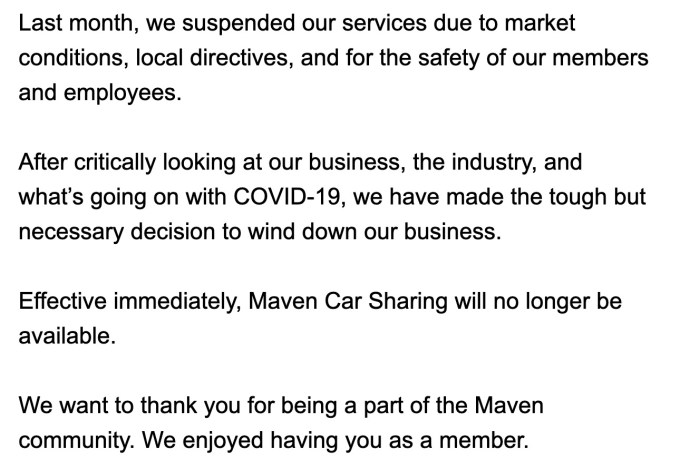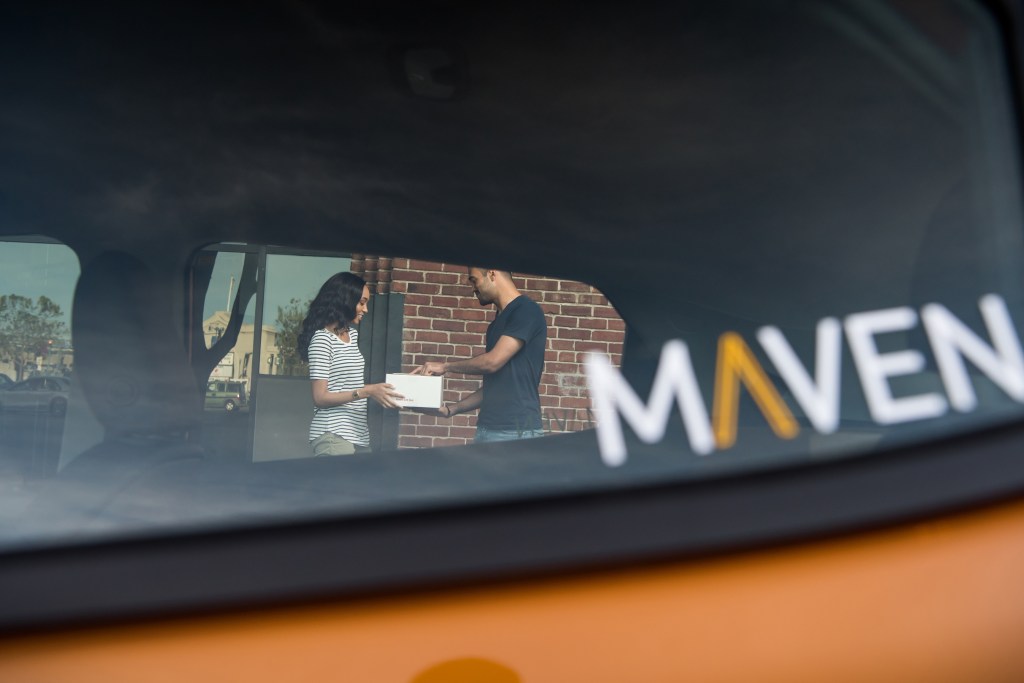GM’s experiment with car sharing is over. The automaker Tuesday said its Maven car-sharing service, which launched in 2016, will shut down for good.
Maven had paused service due to the COVID-19 pandemic. The company sent an email to customers Tuesday that after examining the business, the car-sharing industry and COVID-19, it decided to shutter the service permanently. The Verge was the first to report the story.
The car-sharing service has struggled for months, long before COVID-19 upended the “shared” mobility sector. Last year, Maven scaled back and stopped service in nearly half of the 17 North American cities in which it operated. Maven continued to operate in Detroit, Los Angeles, Washington, D.C. and Toronto. However, two programs within Maven, its consumer car-sharing and peer-to-peer service, also stopped in Washington, D.C. Only a program directed at gig workers was still operational in that city.
GM confirmed to TechCrunch that it has started to wind down Maven. All assets and resources will be transferred to GM’s Global Innovation organization, as well as the larger enterprise, according to a GM spokesperson.
The company confirmed that all operations should be concluded by later this summer. Maven had already suspended its consumer car-sharing and a peer-to-peer service due to COVID-19. A separate program directed at gig economy workers has been “very limited and will continue to wind down,” a GM spokesperson said.
“We’ve gained extremely valuable insights from operating our own car-sharing business,” Pamela Fletcher, GM’s vice president of global innovation, said in an emailed statement. “Our learnings and developments from Maven will go on to benefit and accelerate the growth of other areas of GM business.”
Below is a screenshot of the email sent Tuesday morning to Maven customers.

The company doesn’t have plans to re-enter the car-sharing business. The company told TechCrunch that it “will take the great insights we’ve gained from Maven and leverage its car-sharing technology to provide new GM fleet services, and explore other new service offerings.”
Maven was designed to bring and expand several of GM’s existing test programs under one brand. At the time of its launch, Maven was essentially three car-sharing services in one that included a city-based service that rented GM vehicles by the hour through an app and another for urban apartment dwellers in Chicago and New York.
Maven developed and launched a smartphone app, which was used by customers to search for and reserve a vehicle, unlock the door and remotely start, cool or heat the car.
It was an important launch for GM and its Chairman and CEO Mary Barra, who used a study commissioned in the wake of the ignition switch engineering scandal to accelerate her plans to transform the culture and operations at the automaker. Dozens of executives participated in transformational leaders programs; Maven was one of the fruits that spun out of that.
A wave of other initiative and investments were announced in 2016 that showed GM’s shift in interest toward unconventional transportation businesses that were adjacent to its core business of producing, selling and financing cars, trucks and SUVs to consumers.
But Maven never quite settled on one business model. The car-sharing service continued to evolve, leaving and entering cities or tweaking where it offered certain programs. For instance, the company launched in 2017 Maven Reserve in Los Angeles and San Francisco to allow customers to rent its GM-branded vehicles for a month at a time. It also started Maven Gig in hopes of tapping into a growing demand from rideshare and delivery app drivers.
Maven then launched a service in summer 2018 in Chicago, Detroit and Ann Arbor that let owners rent out their personal GM-branded vehicles through its Maven car-sharing platform. The peer-to-peer car rental service was designed to operate in a similar fashion to how Turo and Getaround work.
The service’s demise seemed to begin after the company lost its CEO Julia Steyn in January 2019. It scaled back a few months later and was only operating in a handful of cities up until the COVID-19 pandemic put further pressure on the business.
































Comment